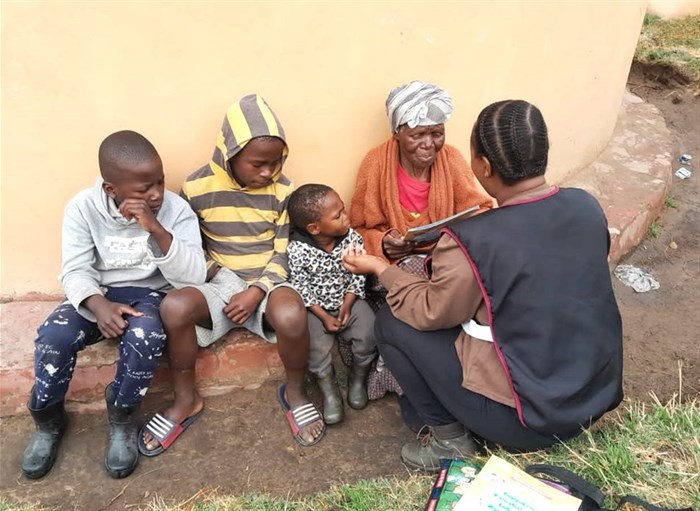Unemployment and lack of education – especially literacy – are two key concerns in South Africa. The official unemployment rate was 31,9% in the third quarter of last year. In addition, the 2030 Reading Panel Report found that most children leave Grade 1, without knowing the alphabet and 82% of Grade 4 learners cannot read for meaning.
Enter an unusual partnership between the Social Employment Fund (SEF) and Nal’ibali, the national reading-for-enjoyment campaign, which is addressing both these issues. It provides an effective barometer of what can be achieved through collaboration.
Why social employment?
The SEF provides temporary work for previously unemployed people, who learn valuable skills and earn a stipend. Unlike a social grant, the stipend is paid in exchange for work participation.
Social employment programmes are not a fix-all but a strategy to complement private sector initiatives of promoting economic growth and enterprise development. It’s about opening doors for more South Africans to have a chance to participate in the economy while gaining confidence and dignity.
Tackling literacy through telling stories
Nal’ibali operates in seven of our nine provinces, providing free online audio stories and story books to children in all 11 official languages and Braille. The NGO promotes and encourages reading as a daily activity.
The partnership focuses on working with stakeholders in the early literacy ecosystem to help children with reading, both at home and in schools by supporting caregivers, ECD practitioners, educators and community members. It’s about encouraging children to enjoy reading and creating reading clubs and libraries within communities.
Tips and guides are provided along with reading materials, hanging libraries and storybook treasure boxes to help create reading spaces at home and school.
According to the National Reading Barometer SA, only 32% of South African adults frequently read books. Nal’ibali has several community-based solutions to help increase reading among South African adults too. And, if some caregivers are unable to read, wordless picture books are used to create their own stories around the images on the pages.
Job creation = empowerment
As a SEF Strategic Implementation Partner, Nal'ibali has provided 1 200 jobs over the past year for a second cohort of participants. 15 work as administrative staff, while the others help run family and community literacy programmes.
In preparation, a five-day literacy training programme introduces SEF participants to the importance of reading and literacy. They are taught the art of storytelling, writing, play-based learning, drawing and colouring in to stimulate a child’s imagination. They also learn how to engage with children and their caregivers to encourage reading as a daily practice.
Participants are also taught soft skills like planning, diary management, administration and self-monitoring. ‘The SEF participants not only become our reading and literacy ambassadors but are soldiers on the ground, reporting back on community needs,’ says Mpho Ramasodi, head of programmes at Nal’ibali. ‘
World Read Aloud Day
One of the biggest events on the Nal’ibali calendar is World Read Aloud Day (WRAD), celebrated on the first Wednesday in February. It challenges South Africans to read aloud to the children in their lives. The target for 2024 is to reach 3 million children on February 7.
The 2024 WRAD special story, ‘The Lost Kitten’, by child author Stacey Fru, is free to download from the Nal’ibali website.
‘Pledging is a huge undertaking and with the ambitious target of reading to 3 million children on the day, we have relied heavily on our SEF participants to spread the word and collect community pledges,’ says Ramasodi.
Why reading aloud?
‘There are many benefits to regularly reading aloud and telling stories,’ says Ramasodi. ‘It’s important to understand the link between reading, storytelling and a child’s future success. Young children who are read to in languages they understand, perform better in school, develop better memories and have stronger vocabularies and comprehension skills.’
The financial cost of illiteracy
According to a report by The World Literacy Foundation, illiteracy costs South Africa’s economy R119.03 billion each year, due to reduced earning capacity and social costs.
It says: ‘Illiteracy is ruining lives and is linked with an array of poor life outcomes, such as poverty, unemployment, social exclusion, crime and long-term illness. Literacy can change everything in the life of a young person and provide a pathway to reach their full potential.’
Changing lives
The real value of the partnership between SEF and Nal’ibali is in addressing both the unemployment and literacy problems in South Africa. SEF participants are earning money and are able to provide for themselves and their families. They are being upskilled while simultaneously helping South Africans improve their reading and literacy which, in turn helps end the cycle of unemployment and illiteracy.
And, although the SEF offers temporary employment, some of the participants have been offered permanent jobs at Nal’ibali. The others will leave with some vital skills to seek permanent employment.
































